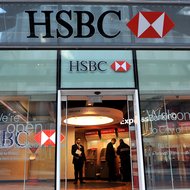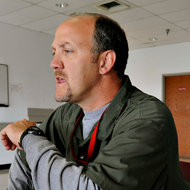 Michael Probst/Associated PressThe headquarters of Deutsche Bank in Frankfurt.
Michael Probst/Associated PressThe headquarters of Deutsche Bank in Frankfurt.
PARIS — The German central bank is investigating allegations that Deutsche Bank hid billions of dollars in losses to avoid a potential bailout during the financial crisis, people with direct knowledge of the matter said on Thursday.
The Bundesbank is sending a team to New York next week to look into the allegations, the people said, noting that while the bank was obligated to look into the matter, there was no certainty that the investigation would result in any enforcement measures. The people spoke on condition of anonymity because they were not authorized to speak publicly about the sensitive legal matter.
The investigation stems from allegations that the German lender understated the value of credit derivatives positions beginning in 2007 that were worth as much as $130 billion in so-called notional terms.
The financial positions came under severe stress at the height of the financial crisis, when many complex derivatives could not be traded at all. Had the position been properly reported, according to the allegations, Deutsche Bank would have needed a bailout from the German government. One of the country’s smaller lenders, Commerzbank, received 18.2 billion euros, or $23.3 billion, in taxpayer funds in 2009.
In contrast, Deutsche Bank has avoided the stigma of a bailout during the financial crisis. The German firm is expected to argue that its accounting at the time was in line with industry standards, and that its external auditors signed off on it.
One of Deutsche Bank’s former employees, a quantitative risk analyst named Eric Ben-Artzi, had reported the alleged abuses to the U.S. Securities and Exchange Commission through the regulator’s new whistle-blower program. Mr. Ben-Artzi is also suing the bank, claiming wrongful dismissal, and stands to gain financially if the bank is fined.
News of the Bundesbank’s involvement was reported earlier by The Financial Times. Shares of Deutsche Bank were trading higher in Frankfurt on Thursday.
Ute Bremers, a spokeswoman for the German central bank, said in a statement that the central bank did not comment on individual investigations.
‘‘You may assume that supervisors always investigate allegations that have been raised in order to verify their validity,” she added. “This is the task of banking supervisors.’’
Deutsche Bank declined to comment. Ronald Weichert, a bank spokesman in Frankfurt, referred to a December statement that noted the allegations ‘‘have been the subject of a careful and thorough investigation, and they are wholly unfounded.’’
The people making the allegations, the statement said, had ‘‘no personal knowledge of key facts and information.’’
‘‘We have and will continue to cooperate fully with our regulators on this matter,’’ the Deutsche bank statement said.
Deutsche Bank already faces inquiries and lawsuits related to its conduct before or during the financial crisis. Last month, the bank allocated an additional 600 million euros ($775 million) to cover its legal costs, a move that reduced its pretax profit for 2012 by the same amount.
The additional money was primarily a response to numerous lawsuits stemming from Deutsche Bank’s sales of mortgages and mortgage-related derivatives in the United States.
The bank has also been ensnared by the global investigation into interest rate manipulation. In November, Deutsche Bank said it had set aside money for potential penalties related to rate rigging. In total, Deutsche Bank has set aside 2.4 billion euros ($3.1 billion) to cover legal costs.
Besides raising further questions about ethical standards at Germany’s largest bank, the Bundesbank inquiry could weaken Deutsche Bank’s claim to have weathered the financial crisis better than most peers. While Deutsche Bank did not take a bailout directly from the government, it benefited from measures that the German and U.S. governments as well as central banks have undertaken since 2008 to contain the financial crisis.
Jack Ewing contributed reporting.
Article source: http://dealbook.nytimes.com/2013/04/04/german-authorities-are-said-to-investigate-deutsche-bank/?partner=rss&emc=rss


